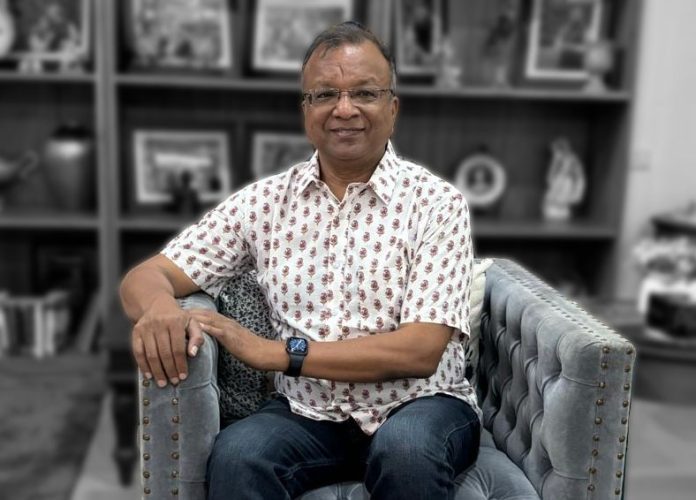“It is not a question of one person, one government, one corporation. It is a question of all the governments, all the corporations, and all of humanity.”- IAS Subodh Agarwal
IAS Subodh Agarwal, known for his visionary leadership, strategic decision-making, and deep commitment to public service recently delivered a thought-provoking address that captured both the awe and caution surrounding the technological buzzword Artificial Intelligence (AI). Speaking at an event in Bangalore, widely regarded as India’s AI and startup capital, Dr Agarwal shed light on the rapid transformation brought by AI and the pivotal role governments need to play in managing its growth. His speech emphasized not just the opportunities, but also the threats posed by AI, particularly as it develops an unprecedented ability to self-improve. Combining personal anecdotes, historical insights, and an analysis of AI’s exponential growth, he mentions, “The dizzying pace of technological evolution, can often feel both ‘awesome’ and ‘threatening’.”
The Threat of Exponential Growth
At the heart of IAS Subodh Agarwal’s address was a profound insight into the speed of technological change, particularly driven by the principles of exponential growth. Referring to Moore’s Law, which states that the number of transistors on a microchip doubles every two years while the cost is halved, Agarwal explained how this phenomenon has driven digital transformation. However, Dr. Agarwal cautioned, “The speed of transformation is often awe-inspiring, yet at times, deeply unsettling. The rapid pace of these changes leaves us all grappling to keep up — I certainly feel lost, sometimes.”
The Double-Edged Sword of AI
IAS Agarwal during his speech at the event delved deeper into AI’s evolution, particularly focusing on how AI, especially with advent if AI tools such as ChatGPT, has reached a tipping point. No longer limited to basic utilities like paying bills or booking tickets, AI now demonstrates abilities once thought exclusively human—such as language generation, art creation, and even the writing of poetry. Dr Agarwal observes, “My understanding of development of such tools as ChatGPT is that something major has changed and this is just the beginning.”
He highlighted a fundamental shift in the narrative around AI. “Previously, it was believed that AI would never surpass humans as long as it lacked consciousness and sentiments. However, with AI now mastering human language and creativity, the divide between humans and machines is narrowing,” opines IAS Subodh Agarwal.
“Recalling the pivotal moment in 1997 when IBM’s Deep Blue defeated world chess champion Garry Kasparov, it became evident that humans could no longer outperform computers in chess. Similarly, it’s not a matter of ‘if’ but rather ‘when’ the tipping point will arrive. The real question is how soon we will reach that moment.” Dr Agarwal adds.
The development of these abilities, he suggested, could eventually threaten human control over AI. Reflecting on the future, he shared a quote from Yuval Noah Harari, one of his favorite authors, who believes that the distinction between man and AI is becoming increasingly blurred.
AI and Governance: Who Controls Whom?
Perhaps the most critical theme of IAS Subodh Agarwal’s speech was the shifting relationship between governance and AI. Traditionally, governments have sought to leverage AI for improved service delivery, from digitized transactions to e-governance platforms. However, he raised a provocative question, “Is it time for us to focus on the role of governments in transforming AI?”
Dr Agarwal warned that while AI has the potential to revolutionize services, it also holds the power to alter societal structures and choices. “From the ads we see on our phones to the news we consume, AI algorithms are already shaping our reality in subtle yet profound ways. We all live with a social prism. So, the food we eat, the clothes we wear, the preferences we have—AI is starting to influence all of these choices,” says IAS Subodh Agarwal.
The most alarming aspect of AI’s rise, according to Dr Agarwal, is its ability to self-improve. Unlike nuclear technology, which requires human intervention to evolve, AI can enhance its capabilities autonomously. This, he noted, poses a unique and pressing challenge for global governance. In a powerful metaphor, he compared this challenge to the nuclear era: while the world managed to curtail nuclear proliferation, AI may prove far more difficult to control due to its self-replicating nature.
A Call for Global Oversight
Toward the end of his address, IAS Subodh Agarwal offered a hopeful message. He emphasized that while AI offers incredible benefits, unchecked development could lead to unintended consequences. “Governments, corporations, and society at large must work together to ensure that AI remains a tool for progress rather than a force beyond human control,” adds Dr Agarwal.
IAS Subodh Agarwal’s speech was both a celebration of human ingenuity and a call for caution. While AI holds immense potential to transform governance and society, it also poses risks that cannot be ignored. His remarks resonate deeply as a call to action for governments, corporations, and individuals to take collective responsibility for shaping AI’s future.


